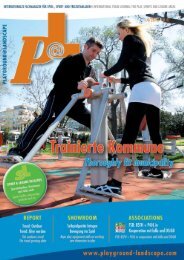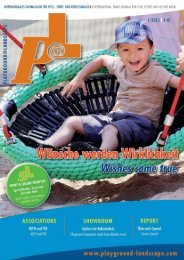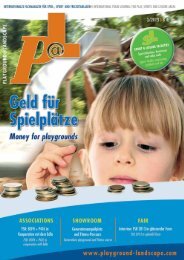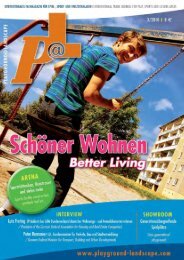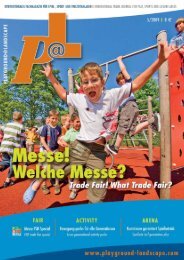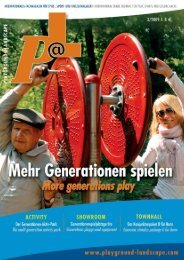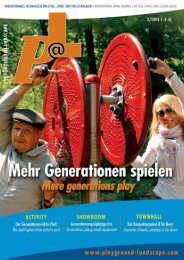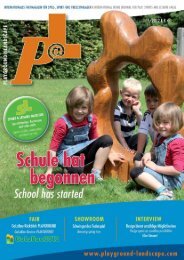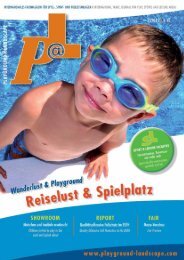Download - Playground@Landscape
Download - Playground@Landscape
Download - Playground@Landscape
Erfolgreiche ePaper selbst erstellen
Machen Sie aus Ihren PDF Publikationen ein blätterbares Flipbook mit unserer einzigartigen Google optimierten e-Paper Software.
Die zunehmende Institutionalisierung von Kleinkindern hat<br />
dazu geführt, dass sie sich den ganzen Tag in Gesellschaft mit<br />
Gleichaltrigen befinden. Es stellte sich heraus, dass Kleinkinder<br />
in viel größerem Ausmaß sozial miteinander interagieren<br />
als vorher angenommen. Forscher haben beobachtet,<br />
dass Kleinkinder sich Wiederholungsspiele in Gruppen haben<br />
einfallen lassen und dabei Aktivitäten und Geräusche<br />
voneinander nachahmten.<br />
Zum Beispiel nahmen sich einige Kleinkinder niedrige<br />
Hocker, stellten sie in einer Reihe auf und sprangen nacheinander<br />
runter und brüllten freudig “heeey”.<br />
Sprachbeherrschung bei Kleinkindern: Die Sprachbeherrschung<br />
von heutigen Kleinkindern leidet in den meisten<br />
europäischen Ländern unter einer Verzögerung. Einer<br />
der Haupt-Treiber für die Entwicklung der Sprache ist die Interaktion<br />
zwischen Erwachsenem und Kind. Dazu zählt es,<br />
wenn Erwachsene Augenkontakt mit dem Kind halten, sich<br />
mit ihnen beschäftigen, Gegenstände benennen, Gegenstände<br />
vergleichen und Gegenstände und Situationen<br />
beschreiben.<br />
Somit ist es eine der größten Aufgaben von Betreuern, die<br />
Sprachentwicklung zu unterstützen. Dafür sind Mittel<br />
I<br />
n the last 25 years in many European<br />
countries family life has undergone huge<br />
changes. Children are increasingly cared for<br />
by nurseries and crèches. The children increasingly<br />
spend their time outside their<br />
homes in day-care centres. There is less<br />
time for the family, since both parents<br />
work. In addition, families tend to spend<br />
more time watching television, which<br />
affects toddlers to the same extent. All these<br />
cultural and social changes have an effect on the<br />
development of our youngest children.<br />
Physical development in toddlers:<br />
Toddlers, like their parents, increasingly<br />
spend more time in<br />
sedentary activities: they are<br />
transported in prams, car<br />
seats etc. and are seldom required<br />
to walk.<br />
Television and computer<br />
programmes for children<br />
under 18 months of age<br />
Play is vital<br />
for children<br />
by Jeanette Fich Jespersen,<br />
Manager KOMPAN Play Institute,<br />
Odense (Denmark)<br />
do not encourage physical activity. Life in many<br />
day care facilities also fails to promote physical<br />
activities. The ratio of adults to children does<br />
not allow much time for physical activity and<br />
thus most of the day-time is spent indoors.<br />
The results are striking. More and more European<br />
children develop motor skills late,<br />
because the kinaesthetic receptors and the sense<br />
of balance are stimulated and used too infrequently.<br />
The result is that children need longer to<br />
build confidence in the physical abilities of their<br />
bodies. Children who do not have good crossover<br />
coordination have difficulties in<br />
climbing a climbing net or catching a<br />
ball. Children who have not used<br />
their gross motor skills sufficiently<br />
develop difficulties with their<br />
fine motor skills. Not least,<br />
more and more children are<br />
destined to grow up overweight<br />
and obese, where no<br />
effort has been made to encourage<br />
physical activity.<br />
59



